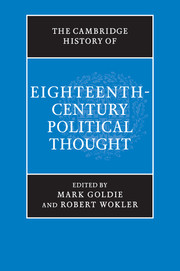Book contents
- Frontmatter
- Introduction
- Part I The ancien régime and its critics
- Part II The new light of reason
- Part III Natural jurisprudence and the science of legislation
- 9 German natural law
- 10 Natural rights in the Scottish Enlightenment
- 11 The mixed constitution and the common law
- 12 Social contract theory and its critics
- Part IV Commerce, luxury, and political economy
- Part V The promotion of public happiness
- Part VI The Enlightenment and revolution
- Biographies
- Bibliography
- Index
- References
12 - Social contract theory and its critics
from Part III - Natural jurisprudence and the science of legislation
Published online by Cambridge University Press: 28 March 2008
- Frontmatter
- Introduction
- Part I The ancien régime and its critics
- Part II The new light of reason
- Part III Natural jurisprudence and the science of legislation
- 9 German natural law
- 10 Natural rights in the Scottish Enlightenment
- 11 The mixed constitution and the common law
- 12 Social contract theory and its critics
- Part IV Commerce, luxury, and political economy
- Part V The promotion of public happiness
- Part VI The Enlightenment and revolution
- Biographies
- Bibliography
- Index
- References
Summary
The historical background
At the heart of social contract theory is the idea that political legitimacy, political authority, and political obligation are derived from the consent of the governed, and are the artificial product of the voluntary agreement of free and equal moral agents. On this view, legitimacy and duty depend on a concatenation of voluntary individual acts, and not on ‘natural’ political authority, patriarchy, theocracy, divine right, necessity, custom, convenience, or psychological compulsion. Michael Oakeshott was thus right to call contractarianism a doctrine of ‘will and artifice’ (1975a, p. 7).
While traces of contract theory can be found in ancient and medieval thought, and while the doctrine has recently been revived by John Rawls, it is generally agreed that the golden age of social contract theory was the period 1650–1800, beginning with Hobbes’s Leviathan (1651) and ending with Kant’s Rechtslehre (Metaphysics of Morals, 1797;Rawls 1972, pp. 11–13; Riley 1982, 1983). For at least the following century it was eclipsed by utilitarianism, Hegelianism, and Marxism. But between the mid-seventeenth and the early nineteenth centuries consent emerged as the leading doctrine of political legitimacy. Hobbes urges in chapter 42 of Leviathan that ‘the right of all sovereigns is derived originally from the consent of every one of those that are to be governed’, and in chapter 40 he insists that human wills ‘make the essence of all covenants’ (Hobbes 1991, pp. 395, 323). Locke in the second of his Two Treatises of Government argues that ‘voluntary agreement gives … political power to governors’ (TTG, ii, §173, p. 383).
- Type
- Chapter
- Information
- The Cambridge History of Eighteenth-Century Political Thought , pp. 347 - 376Publisher: Cambridge University PressPrint publication year: 2006
References
- 11
- Cited by



